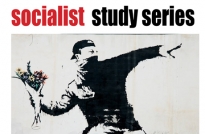Features
You are here
Occupy accessible education

January 10, 2012
As the 1% tries to make students and workers pay for the economic crisis, people around the world are fighting back. On February 1 students across Canada will be mobilizing to demand accessible education for the 99%.
The continual decline in funding to the provinces for Post-Secondary Education (PSE) has led to a sharp rise in tuition fees bringing record levels of student debt, with some students graduating with debts the size of mortgages.
According to Roxanne Dubois, National Chairperson of the Canadian Federation of Students (CFS), today “students collectively owe more than $15 billion in student debt to their government and this is limiting their ability to persist in their education and to meaningfully participate in the economy.”
As funding decreases and tuition increases, not only is the quality of education put at risk but PSE as a whole also becomes less accessible for many marginalized groups and communities.
The economic crisis is being used as a justification for governments across the spectrum to further raise tuition fees—including the NDP government of Nova Scotia that just announced fee hikes.
Public education has been under attack since the massive cuts to social spending initiated by the federal Liberals in the 1990s. But there are billions for bank bailouts, corporate tax cuts and escalating military spending. The money is there, but it’s only going to the 1%.
Fighting Back Globally
The economic crisis and the failure of social democracy to provide an alternative has created a series of fight-backs across the globe that have not been seen for decades.
All over the world, we see students, workers, communities experiencing systemic poverty, the unemployed and the disfranchised rising up in resistance to a global agenda that puts profits before people. Time Magazine had no choice but to name “The Protestor” its person of the year.
Students in the United Kingdom protested the tripling of tuition fees by taking to the streets, occupying campuses, and even taking over a Conservative Party office.
Their Chilean counterparts organized nation-wide protests and shut down the education system by going on strike, calling for a more accessible and equitable education system.
Mohamed Bouazizi, an unemployed Tunisian student, lit his body on fire in protest, triggering the Arab Spring.
Egyptian students have been part of their revolution–protesting in Tahrir Square, occupying their universities and building solidarity with workers struggles.
In Quebec, 200,000 students went on strike in November as part of an escalating campaign.
Finally, an anti-capitalist movement has re-emerged under the banner of Occupy, confronting the current system as being unrepresentative of the large majority of the population, now widely referred to as the 99%.
While the Occupy encampments were evicted, the next step is to take the movement to where the 99% study and work. This will not only increase the movement quantitatively by involving much more people, but also qualitatively by challenging dominant institutions–universities and workplaces.
From Chile to Egypt, youth movements are strongest when they mobilize students and connect with workers. Together we can change the world.
February 1st Day of Action
Students across Canada have an upcoming opportunity to contribute to the growing global resistance. The CFS is calling on all PSE students across the country to take to the streets on February 1 to call on the federal government and our respective provincial governments to properly fund PSE by lowering tuition fees, increasing per-student funding, and making education more accessible.
As the energy of the Arab Spring and the Occupy movement spreads, students across Canada have the chance to follow the example of Quebec and stand up for accessible education.
Organizing on Campus
The work of radical student organizers in Chile to launch a nation-wide student strike and in the United Kingdom to occupy dozens of campuses in the is crucial in the fightback against neoliberalism.
Here in Canada, like our sister organizations in the United Kingdom, Egypt, and many other countries, the International Socialists are working to build and strengthen this wave of resistance across campuses.
We recognize that the important work of progressive student, worker and community organizations requires participation of revolutionaries who want to see an end to a world filled with systemic injustice and oppression. The fight for accessible educatino is part of a broader fight for a better world.
All out Febuary 1!
(for more information visit educationisaright.ca)
Section:
Topics:
- Log in to post comments










